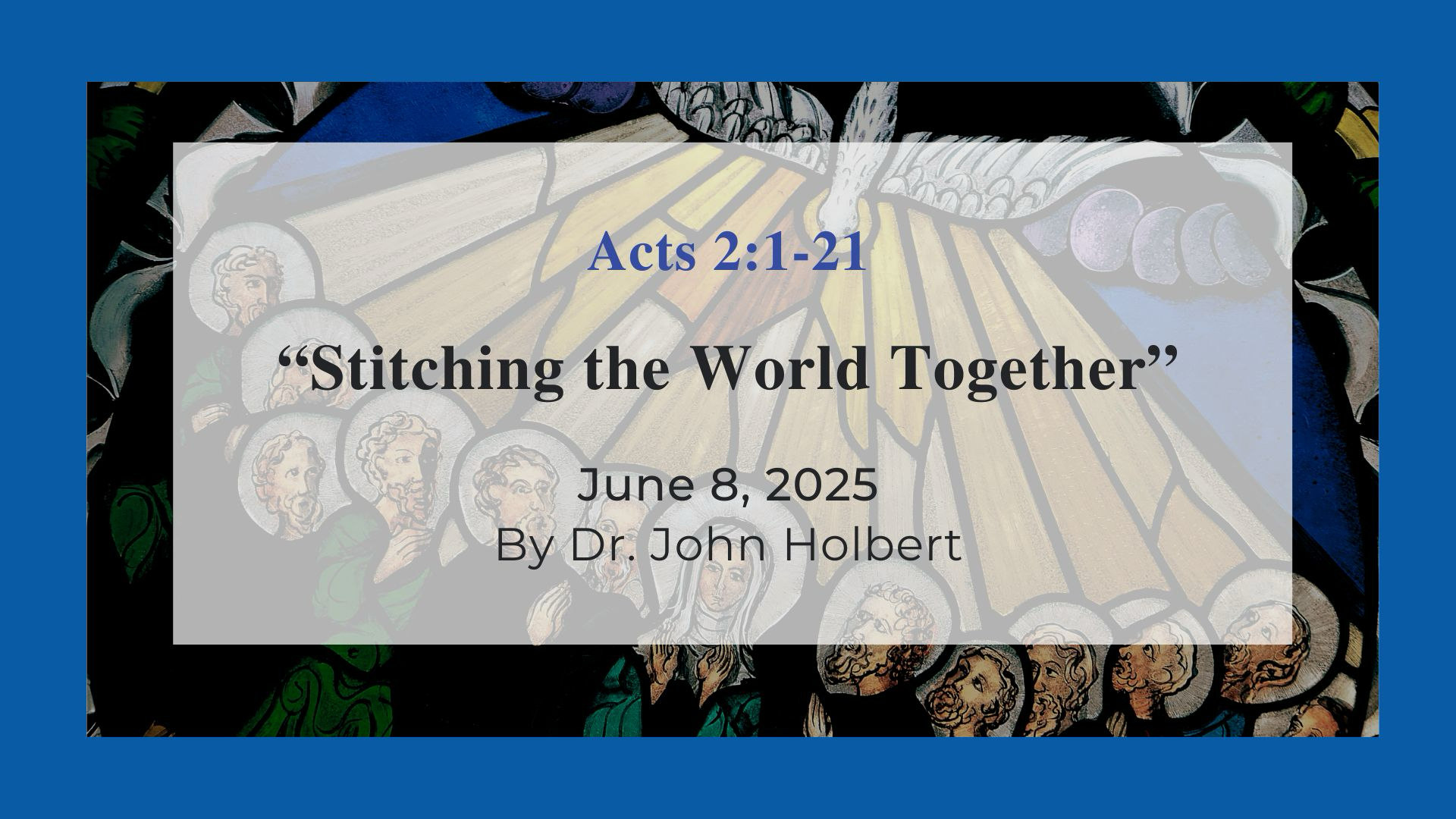Stitching the World Together - Reflections on Acts 2:1-21, Pentecost, Year C
by John C. Holbert on Monday, April 14, 2025

Two texts usually dominate comments on the Day of Pentecost: Gen.11:1-9 and Acts 2:1-21. Both have to do with the use of language. The former leads to divisions in the fabric of the world, while the latter leads to a grand unity, but both affect their respective communities’ alterations by the employment of language. In Genesis, the attempt to scale the heights of YHWH by the means of advanced human technology results in YHWH’s response of creating a myriad of languages, thereby making the dwellers on the plain of Shinar unable to understand one another, leading to their scattering abroad upon the face of the whole earth. But here in Acts, the use of language will have a very different outcome.
The scene in Acts has become justly famous since every year at this time, the church celebrates what happened. It is the “day of Pentecost,” a translation of the Hebrew “Feast of Weeks” (see 2 Macc.12:32 and Tobit 2:1). This yearly feast finds its roots in Ex.23:16; 34:12; Lev.23:15-21; Deut. 16:9-12, where the texts demonstrate an agricultural and nomadic background with the offering of fruits and lambs. Modern churches are festooned with the color red, suggestive of the “tongues of fire” that appeared to the disciples assembled for the celebration. Because I am a United Methodist, the very symbol of our denomination—the cross and flame—finds its echoes in this scene. Still, more accurately, the text says, “individual tongues AS OF fire appeared, just as “a sound from heaven LIKE THAT of a strong wind” filled the house where they were sitting (Acts 2:1,3). In very typical Bible metaphor, especially when the appearance of divine power is involved, the language used is comparative rather than literal. “As of” and “like” both describe and obfuscate the event.
“All were filled with the Holy Spirit,” fulfilling the promise made by Jesus both in the Gospel at Luke 24:49 and earlier in Acts at 1:4-5, 8. “They began to speak in other languages just as the Spirit gave them ability” (NRSV) or “gave them to declaim.” Plainly, these “other languages” are not ecstatic or “angelic” speech, but are quite recognizable and comprehensible languages, matching the speech of those Jews in the assembly who have come from all over the known Roman world. Too many have imagined that what Luke refers to here is ecstatic glossalalia, and that is the Greek word used. There are entire Christian communities that base acceptance on the ability to experience “speaking in tongues,” that is speech, sometimes unintelligible, that comes straight from God after a period of intense prayer and worship. And there can be no doubt that such experiences did occur in the earliest Christian communities, as Acts 10:45 and 19:6, along with Paul’s extensive discussion of the phenomenon in 1 Cor.12-14 make certain, a heavenly speech under the influence of the Holy Spirit.
But that is not what happens at the day of Pentecost. The text makes this clear. After giving a list of those Jews assembled for the Feast, after carefully indicating their home countries, “from every nation under heaven” (Acts 2:5): Parthians, Medes, Elamites, Mesopotamians, Judeans, Cappadocians, etc., the entire crowd was gathered because of the sound of the wind (the sound brings them, not the wind), and “were confused because each was hearing them speak in their own language. They were astonished and amazed. They said, ‘Look! Are not all of these people who are speaking Galileans? So how can each of us hear in our own native language?’” (Acts 2:6-8). The miracle is not some ecstatic speech in unknown tongues; the miracle is quite the reverse. They all can understand every word, though the speakers are all plainly Galilean!
And that fact makes Luke’s central point: the gift of the Holy Spirit at Pentecost occurred in the presence of Jews from all over the world. And that will be the offer made by Peter’s sermon (Acts 2:38). This first part of the fulfillment of the coming of the Holy Spirit consists of the offer of the Gospel of Jesus to the Jews, to all the Jews. Later, as Acts 10-15 insists, the Gentiles will receive the same offer. The sermon at Pentecost inaugurates the beginning of the Christian communities in Jerusalem and represents the first announcement of the movement that eventually will include two billion of the world’s people.
And it starts in language. In Genesis, the world’s many languages are the result of God’s separation of peoples in order to stop them from their attempts to usurp the very prerogatives of God. In Acts, those same languages, from the entire known world, make possible the first hearers of the Gospel of Jesus Messiah, the first converts to his movement. Far from separating them, their individual languages are in fact vehicles for their hearing of the good news, leading to their potential unity. “In the beginning was the Word,” says John in his Gospel, and that word both was with God and was God. Indeed, the Gospel is centered in the word, a word intelligible and life-giving all at once. That is the ultimate meaning of the event at that first Christian Pentecost. The world’s unity may be found in that word and its powerful speaking through time.
